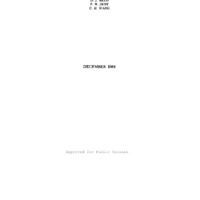-
Title
-
Fate Of Pentaborane-9-H3 In Small Animals And Effects Of Pentaborane-9 Upon Glucose Catabolism By Rats
-
Date
-
1964
-
Index Abstract
-
Not Available
-
Photo Quality
-
Not Needed
-
Report Number
-
AMRL TR 64-112
-
Corporate Author
-
Oregon State University
-
Laboratory
-
Biomedical Laboratory
-
Extent
-
34
-
Identifier
-
AD0610571
-
Access Rights
-
CFSTI
-
Distribution Classification
-
1
-
Contract
-
AF 33(657)-11757
-
DoD Project
-
6302
-
DoD Task
-
630202
-
DTIC Record Exists
-
Yes
-
Distribution Change Authority Correspondence
-
None
-
Distribution Conflict
-
No
-
Abstract
-
The fate of pentaborane-9-H(3) B5H9(3), evenly labeled with tritium) in small animals was investigated. Rats given B5H9(3) by intraperitoneal injection evolved 36-37% of the tritium label as molecular hydrogen over a 2-3 hour period. A non-volatile hydrolysis intermediate rapidly formed in the bloodstream concurrently as molecular hydrogen was evolved by treated animals. Tritium in the hydrolysis intermediate was found to be nonexchangeable into water. However, the hydrolysis intermediate slowly disappeared and approximately an equivalent amount of tritium could be detected in the body water of treated animals. Reaction of heparinized blood and certain nitrogen- containing compounds with B5H9(3) resulted in the formation of a hydrolysis intermediate which had many properties similar to those of the stable intermediate formed in vivo. The effect of pentaborane-9 intoxication upon glucose catabolism by rats was examined. Total respiratory CO2 production by intoxicated rats was slightly greater than that of normal rats. Catabolism of glucose via the glycolytic pathway appeared to be inhibited during the initial 4 hours after B5H9 administration by intraperitoneal injection. The operation of the pentose phosphate pathway may have been stimulated slightly immediately after B5H9 administration, but inhibition of this pathway was noted during the next several hours of glucose assimilation. Pentaborane-9 intoxication appears to affect glucose catabolism for only a 6-8 hour period.
-
Report Availability
-
Full text available
-
Date Issued
-
1964-12
-
Provenance
-
RAF Centre of Aviation Medicine
-
Type
-
report
-
Format
-
1 online resource
-
Creator
-
Reed, D. J.
-
Dost, F. N.
-
Wang, C. H.
 AMRLTR64-112.pdf
AMRLTR64-112.pdf